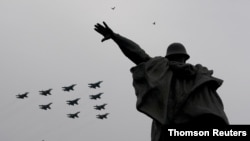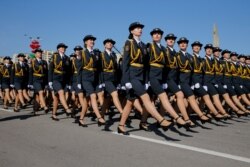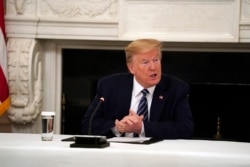Russia on Saturday observed the 75th anniversary of the Soviet victory over Nazi Germany, but the worsening coronavirus outbreak in the country forced it to curtail celebrations.
Russian officials Saturday reported more than 10,000 new COVID-19 cases in the previous 24 hours, boosting the total number of cases to close to 200,000. Russia has reported more than 10,000 cases every day this week, surpassing France and Germany in having the fifth-highest number of cases in the world.
Worldwide, the number of confirmed coronavirus cases surpassed 4 million Saturday. The global death toll rose to more than 275,000, including more than 78,000 in the United States, according to Johns Hopkins University statistics.
President Vladimir Putin marked Victory Day by calling for unity and a dignified honoring of those killed during World War II. At a speech that marked his first public appearance in nearly a month, Putin did not mention the virus or its spread in Russia, focusing solely on the memory of the estimated 25 million Soviet citizens who died in the war.
“We will, as usual, widely and solemnly mark the anniversary date, do it with dignity, as our duty to those who have suffered, achieved, and accomplished the victory tells us,” he said.
The Moscow Victory Day Parade in Red Square was canceled, but neighboring Belarus held a massive Victory Day parade in Minsk, replete with thousands of marching soldiers and spectators in stands.
Belarusian President Alexander Lukashenko moved forward with the parade despite the fact that his country has the highest infection rate in Eastern Europe, according to Johns Hopkins University statistics.
In the U.S., the world leader by far in COVID-19 infections and deaths, some U.S. governors are trying to increase production of essential medical supplies and protective gear after being unable to buy such items earlier in the pandemic.
The U.S. has until recently depended on China and other foreign countries, but the governors of Indiana, Florida, Massachusetts and Missouri said this week that they would push for more in-state production of protective equipment and supplies. Florida Governor Ron DeSantis explained his decision by saying he didn't want “our health destiny” to be dependent on China.
Not enough test kits
Like other countries, the U.S. does not have adequate supplies of test kits, meaning the sickest people get tested before those with mild symptoms, raising the possibility they may not get tested at all and go uncounted.
Pushing to reopen his country, President Donald Trump has touted the U.S. testing system over the past week, despite the system’s failure in the critical early weeks of the outbreak and its underperformance compared with those of some other countries.
During a meeting Thursday with Texas Governor Greg Abbott, Trump said Germany has a “very low mortality rate like we do.” In fact, the U.S. has reported COVID-19 deaths at a rate of 234 per 1 million people, compared with Germany’s reported rate of 90 fatalities per million.
On Friday, Trump insisted “testing isn’t necessary,” an indication of his increasing tendency to reject the advice of health experts.
The Trump administration continues to defend its decision not to release a detailed coronavirus reopening plan for the U.S., maintaining it would have been too narrowly focused for the country’s 50 states.
A White House statement released Saturday and attributed to Robert Redfield, director of the U.S. Centers for Disease Control and Prevention, said the guidance was in “draft form” and “shared prematurely.” Therefore, Redfield was “not yet comfortable releasing a final work product,” the statement said.
On Saturday, it was announced that Redfield, U.S. Food and Drug Administration Commissioner Stephen Hahn and Dr. Anthony Fauci, the director of the National Institute of Allergy and Infectious Diseases and a member of the White House's coronavirus task force, would all be taking measures following exposure to someone at the White House who tested positive for the coronavirus.
Redfield “will be teleworking for the next two weeks,” The Washington Post reported. Hahn, who is in self-quarantine, came into contact with Katie Miller, U.S. Vice President Mike Pence's press secretary, according to a Politico report. And Fauci told the news network CNN on Saturday that he would begin a “modified quarantine.”
Concerns about a second wave of coronavirus outbreaks have been reinforced by new outbreaks in South Korea and Germany as they begin to lift pandemic control measures.
Seoul businesses shut down
South Korea has shut down more than 2,100 bars and other establishments in Seoul after new coronavirus outbreaks were linked to people who frequented nightclubs last weekend after the government relaxed social distancing guidelines. Many of the infections were traced to a 29-year-old man who went to three nightclubs before testing positive.
Schools in South Korea were scheduled to begin reopening next week, but that may be delayed after the new outbreaks. Officials said probes into the new cases would determine the next steps.
Germany is grappling with new outbreaks at three slaughterhouses in what is widely viewed as test of the government’s ability to contain any resurgence of the virus while simultaneously easing restrictions.
International travel to and from the United Kingdom was expected to be further delayed Saturday, with the country’s transportation secretary set to announce a 14-day quarantine for people arriving in the U.K. Prime Minister Boris Johnson was expected to announce on Sunday the easing of some lockdown restrictions.
In central Afghanistan on Saturday, clashes between aid-seeking protesters and police left at least four civilians, including a journalist, dead and 14 others injured, officials said.
The violence erupted as a coronavirus-induced shutdown and partial border closures with neighboring countries disrupted food deliveries into landlocked Afghanistan.
Saturday’s clashes broke out after dozens of people gathered outside the governor’s office in impoverished Ghor province to protest what they said was a lack of official assistance for their poverty-stricken families.
VOA's Ayaz Gul and RFE/RL contributed to this report.








